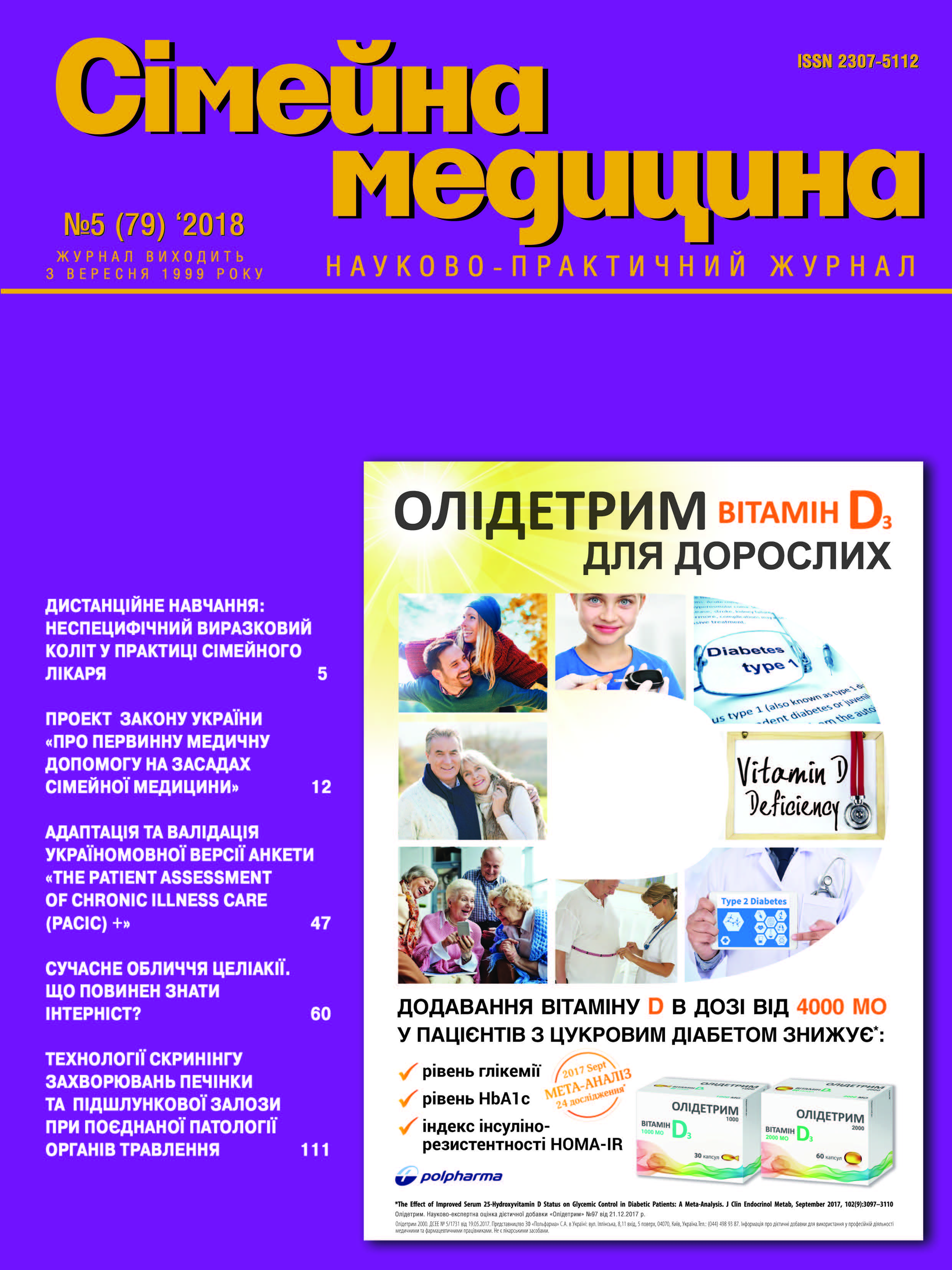Prediction of the Risk of Early Gestational Complications in Women with Chronic Gastritis
##plugins.themes.bootstrap3.article.main##
Abstract
The objective: to determine the risk factors for the development of early gestational complications and their prognostic value in pregnant women with chronic gastritis.
Material and methods. 120 pregnant women at 8–12 weeks of gestation with early gestational complications (threatened abortion (TA), emesis gravidarum, spontaneous miscarriage, missed abortion) were studied. They were divided into two groups: Group 1 included 58 pregnant women with chronic gastritis and Group 2 included 62 women without gastritis. 6 parameters were analysed for factorial attributes: gastritis, gastrin-17 (G-17), progesterone, estradiol, chorionic gonadotropin (HCG), and H.pylory. The method of stepwise inclusion/exclusion was used for the selection of significant factors (Stepwise at the critical threshold for inclusion at p<0,1 and the threshold for exclusion at р>0,2).
Results. When the attributes associated with the risk of threatened abortion were selected, 3 factors have been identified: gastritis, gastrin (G-17), progesterone. The risk prediction model based on these attributes is adequate c2=25,7; p<0,001). There was an increase (p=0,01) of the risk of TA with increased progesterone levels, OR = 1,4 (95% CІ 1,1–1,7) for every 10 units of the parameter increase. There was a higher (p<0,001) risk of TA in pregnant women with gastritis, OR = 5,4 (95% CІ 2,2–13,2) compared with pregnant women without gastritis. When the attributes associated with the risk of emesis gravidarum, 2 factors were identified: the presence of gastritis and H. pylori. The risk prediction model built on these attributes is adequate (c2=13,8; p=0,001). There was an increase (p=0,03) in the risk of emesis gravidarum in the presence of H.pylori, OR = 2,9 (95% CІ 1,1–7,6) compared with pregnant women without H. pylori. When the attributes associated with the risk of spontaneous miscarriage were selected, 2 factors were identified: gastritis and HCG. The risk prediction model built on these attributes is adequate (c2=7,7; p=0,02). According to the results of the analysis, there was a decrease (p=0,04) in the risk of spontaneous miscarriage with increasing chorionic gonadotropin, OR = 0,94 (95% CІ 0,89–0,99) for every 1000 units of the parameter increase. A higher (p=0,05) risk of spontaneous miscarriage for pregnant women with gastritis was found, OR = 2,7 (95% CI 1,0–7,1) compared with non-gastric pregnant women. When the attributes associated with the risk of missed abortion were selected, 1 factor was identified (progesterone level). The risk prediction model constructed on this basis is adequate (c2=4,1; p=0,04). A tendency to decrease (p=0,06) in the risk of missed abortion with increasing progesterone, OR = 0,75 (95% CІ 0,55 1,02) for every 10 units of the parameter increase was found.
Conclusions. The risk factors for the development of early gestational complications in pregnant women with chronic gastritis are hormonal and infectious factors which may contribute to changes in the gastrointestinal motor and evacuation function, cause changes in the acidity of gastric acid and lead to the development of constipation and endogenous intoxication, which cause nausea and vomiting. The nature of the changes and the degree of their severity determine the various clinical manifestations of gestational complications: emesis gravidarum, spontaneous miscarriage, missed abortion.##plugins.themes.bootstrap3.article.details##

This work is licensed under a Creative Commons Attribution 4.0 International License.
Authors retain the copyright and grant the journal the first publication of original scientific articles under the Creative Commons Attribution 4.0 International License, which allows others to distribute work with acknowledgment of authorship and first publication in this journal.
References
Khashan A.S. Increased Risk of Miscarriage and Ectopic Pregnancy Among Women With Irritable Bowel Syndrome / A.S. Khashan, E.M. Quigley, R. McNamee // Clinical Gastroenterology and Hepatology. – 2012. – Vol. 10, № 8. – Р. 902–909. https://doi.org/10.1016/j.cgh.2012.02.014
Shin G.H. Pregnancy and postpartum bowel changes: Constipation and fecal incontinence / G.H. Shin. E.L. Toto, R. Schey // The American Journal of Gastroenterology. – 2015. – Vol. 110. – Р. 521–529. https://doi.org/10.1038/ajg.2015.76
Гвасалия А.Г. Клиническое значение запоров при беременности: автореф. дис. ... канд. мед. наук. Москва, 2004. – 23 с.
Подзолкова Н.М. Клиническое значение запоров в развитии осложнений беременности и послеродового периода / Подзолкова Н.М., Назарова С.В. // Consilium medicum. – 2010. – № 6. – С. 50–54.
American college of gastroenterology Pregnancy in Gastrointestinal Disorders. 2nd edition. 2011. URL: https://gi.org/wp-content/uploads/2011/07/institute-PregnancyMonograph.pdf
Батрак Н.В. Иммунологические аспекты привычного невынашивания беременности / Н.В. Батрак, А.И. Малышкина, Н.В. Крошкина // Акушерство и гинекология. – 2014. – № 12. – С. 10–14.
In vitro spontaneous contractile activity of colonic smooth muscle in naive Lewis rats: Acute effect of gonadal hormones / [C. Baumgartner, T. Hubacher, M. Krayer та ін.]. // J Dig Dis. – 2017. – № 18. – С. 13–22. https://doi.org/10.1111/1751-2980.12438
Gregory J. J. Alpha-fetoprotein and beta-human chorionic gonadotropin: Their clinical significance as tumour markers [Електронний ресурс] / J.J. Gregory, J.L. Finlay // Drugs 57(4):463–7. – 1999. – Режим доступу до ресурсу: https://doi.org/10.2165/00003495-199957040-00001
Tang Y. R. Estrogen regulates the expression of small-conductance Ca-activated K+ channels in colonic smooth muscle cells / Y.R. Tang, W.W. Yang, Y. Wang. // Digestion. – 2015. – № 91. – С. 187–96. https://doi.org/10.1159/000371544
Hogan A.M. Oestrogen inhibits Human colonic motility by a non-genomic cell membrane receptor-dependent mechanism / A.M. Hogan, R. Kennelly, D. Collins. // Br J Surg. – 2009. – № 9. – С. 817–822. https://doi.org/10.1002/bjs.6612
Treatment of Chronic Functional Constipation during Pregnancy and Lactation / K. Charehbbaghi, D.R. Charehbbaghi, F. Wierrani, G. Sliutz. // Z Geburtshilfe Neonatol. – 2016. – № 220. – С. 9–15. https://doi.org/10.1055/s-0035-1554626
Interventions for treating constipation in pregnancy [Електронний ресурс] / [P. Rungsiprakarn, M. Laopaiboon, U.S. Sangkomkamhang та ін.] // Cochrane Database Syst Rev 4 (9). – 2015. – Режим доступу до ресурсу: CD011448. https://doi.org//10.1002/14651858.CD011448.pub2





